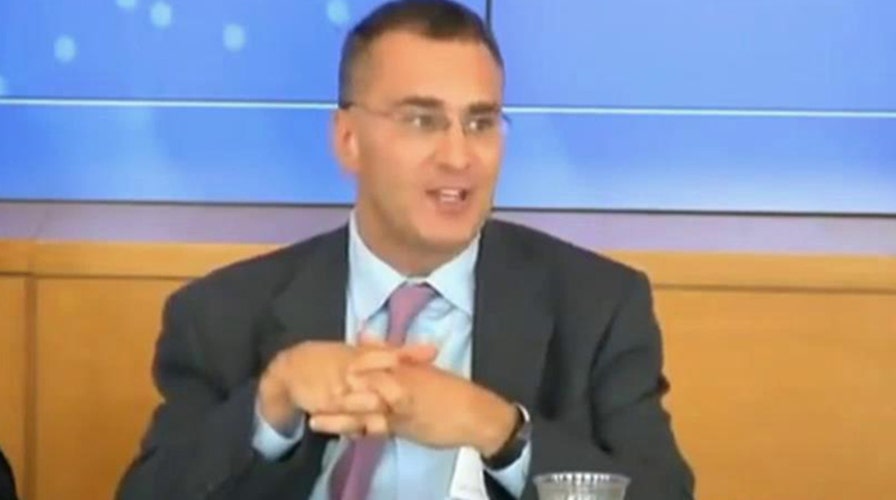Who is 'Mr. Mandate' Jonathan Gruber?
What was the controversial ObamaCare architect's true impact on Pres. Obama's signature legislation? #ObamaCare #GruberGate
This is a rush transcript from "On the Record," November 13, 2014. This copy may not be in its final form and may be updated.
GRETA VAN SUSTEREN, FOX NEWS HOST: So who is this Professor Jonathan Gruber? In his research, it is that that convinced the Obama administration that health care reform could only work if everyone is required to buy insurance. That earned him the nickname "Mr. Mandate."
And joining us, the "The Washington Post's" Catherine Rampell. Catherine, it was your article in March 2012 where I first read about the fact that he was known as the Obama administration as "Mr. Mandate." How far back was he involved in this health care reform in Obama administration?
CATHERINE RAMPELL, "THE WASHINGTON POST": I would actually predate it. It's well before the Obama administration launch of what is now known as Obamacare. He helped design Romneycare. He worked with other governors, including Governor Schwarzenegger, also Republicans to help design what a new health insurance system would like, if you wanted to expand coverage.
VAN SUSTEREN: Did he also work with Capitol Hill?
RAMPELL: Yeah. He worked with members on the Hill, as far as I recall, but basically, more behind the scenes. He was not really writing the legislation so much. He was helping people understand what the legislation did. And he was kind of the numbers guy. He was crunching a lot of the numbers, building these complicated economic models to figure out what the final legislation should look like, what would work, what wouldn't work. And the reason why he became known as Mr. Mandate is because those complicated economic models demonstrated that without an individual mandate, he believed, in any case, that the new system would fail.
VAN SUSTEREN: Is there anyone else -- was there any other Mr. Mandate. Because what sort of struck us is that Leader Pelosi, as far as back as 2009, in a YouTube video, referred to him, not by Mr. Mandate, but it seems his name is the one that surfaces almost consistently with the mandate.
RAMPELL: Yes, that's because his work is the work that was kind of the crux of deciding that that was a crucial part of legislation. Again, not only at the federal level in the Affordable Care Act, but also in Massachusetts. He has been doing this for decades in terms of coming up with these models to help figure out how policy will actually be borne out in the real world. What kinds of things can go wrong, what kinds of things can go right? So he was the one that demonstrated that without this individual mandate, you would have what's called in economics, anyway, "a death spiral," that you would have adverse elections, you would have people who -- only the sick people basically getting insurance, the healthy people not getting insurance, and then you would have costs spiraling out of control.
VAN SUSTEREN: What's with this comic book that you wrote about in your article in 2012? He wrote a comic book?
RAMPELL: He did. This was one of several comic books that I have seen written and produced by various academic economists to try to make a particular economic concept more accessible to the lay public. This was sort of a gimmicky thing. But there were a few at the time. I can think of a few others that came out as well. I'm not exactly sure who the intended audience was for this, I have to say. I don't know that there is a whole lot of overlap between the comic book-reading audience and those interested in health care. But, yes, that was one of his many projects.
VAN SUSTEREN: All right, in your article, you also quote him saying, "Yes, I want the public to be informed by an objective expert." I mean, it's clear that he is making $400,000 from the government as he sort of kept that on the sly, even according to articles. Is there -- does he still hold himself out as objective expert or as an advocate?
RAMPELL: I haven't actually spoken to him in a couple of years so I don't know how he would label himself. But based on my conversations back then and with other economists, I think they do try to think of themselves as objective and neutral to the extent that they can. I'm not sure that's always the case. You know, even if they are not on someone's payroll, they are going to be wedded to some concept or other.
But, you know, his role was really to provide some sort of wonky, technical expertise, not to be like a Machiavellian master strategist, which is -- I think he's sort of been characterized as being now, more recently.
VAN SUSTEREN: I think the fact when he starts calling people stupid and using the system and talking about the fact that transparency is used to fool people, I think he sort of invited that on himself.
I'm taking the last word on that.
Thank you for joining us.
RAMPELL: Thank you.

